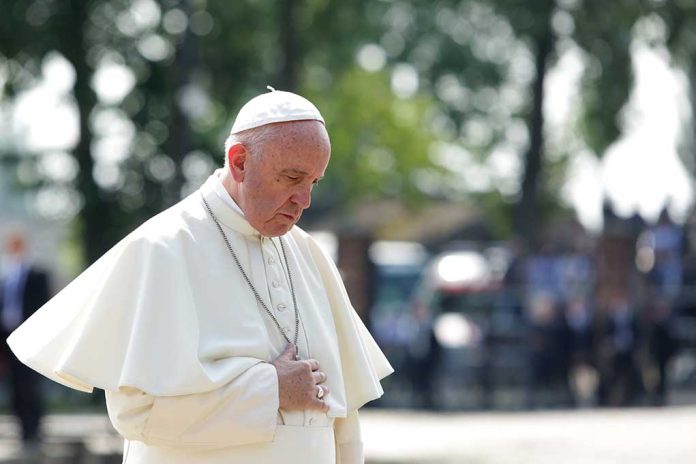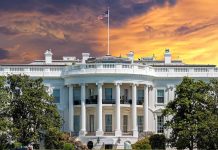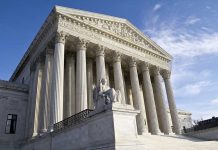
Pope Francis shocks Catholics, urging them to choose the “lesser evil” between Trump and Harris in the upcoming US election.
At a Glance
- Pope Francis labels both Trump and Harris as “against life” due to their stances on immigration and abortion
- The Pontiff urges American Catholics to vote for the “lesser evil” in the November election
- Francis criticizes Trump’s immigration policies as a “grave sin” and Harris’s abortion stance as “assassination”
- The Pope emphasizes the importance of voting, stating “Not voting is ugly. It is not good. You must vote.”
Pope’s Controversial Stance on US Presidential Candidates
In a shocking turn of events, Pope Francis has waded into the murky waters of US politics, delivering a scathing critique of both major presidential candidates. The Pontiff’s comments, made during a press conference following his 12-day tour of Southeast Asia, have sent shockwaves through the American Catholic community and beyond.
The Pope’s remarks highlight the deep moral dilemma facing American Catholics in the upcoming election. By labeling both candidates as “against life,” Francis has effectively thrown a wrench into the traditional voting patterns of this crucial demographic. His words serve as a stark reminder of the complex ethical considerations at play in American politics, far beyond the simplistic left-right divide often presented by the mainstream media.
BREAKING: Pope Francis slammed both U.S. presidential candidates on Friday for what he called anti-life policies on abortion and migration, and advised American Catholics to choose who they think is the “lesser evil” in the upcoming U.S. elections. https://t.co/UEImykiCEA
— The Associated Press (@AP) September 13, 2024
Critique of Trump and Harris: A Tale of Two Evils
Francis didn’t mince words when addressing the policies of both candidates. He took aim at Trump’s hardline stance on immigration, describing the act of “kicking out migrants” as a “grave sin.” This critique aligns with the Pope’s long-standing advocacy for more compassionate immigration policies worldwide.
On the other hand, the Pope’s criticism of Harris was equally harsh. He likened her support for abortion rights as killing babies, reaffirming the Catholic Church’s unwavering stance on the sanctity of life from conception. This puts Harris at odds with a significant portion of the Catholic electorate, who consider abortion a non-negotiable issue.
Pope Francis has described the choice US voters must make in the presidential election as one between the "lesser of two evils" https://t.co/It7ZkDhihr pic.twitter.com/f6onLYb99k
— CNN (@CNN) September 13, 2024
The Pope’s Call to Action: Choose the Lesser Evil
Despite his strong words against both candidates, Pope Francis emphasized the critical importance of voting. He urged American Catholics not to abstain from the electoral process, stating emphatically, “Not voting is ugly. It is not good. You must vote.” This call to civic duty underscores the Pope’s belief in the power of democratic participation, even in the face of difficult choices.
The Pope’s advice to choose the “lesser evil” presents a challenging task for American Catholics. It forces them to weigh the gravity of different moral issues and make a decision based on their conscience. This nuanced approach stands in stark contrast to the often black-and-white rhetoric employed by political campaigns and partisan media outlets.
Implications for the Catholic Vote
With approximately 52 million Catholics in the United States, the Pope’s words carry significant weight. This sizable demographic has traditionally been seen as a key swing vote in American elections. The Pope’s criticism of both major candidates could potentially reshape voting patterns among Catholics, especially in crucial battleground states.
Recent polling data from the Pew Research Center shows that US Catholics are closely divided politically, with 52% leaning Republican and 44% Democratic. The Pope’s comments may cause some voters to reassess their allegiances, potentially leading to unexpected shifts in support come election day.
As the election draws near, it remains to be seen how American Catholics will interpret and act upon the Pope’s advice. One thing is clear: the moral complexities highlighted by Francis’s comments ensure that this election will be about far more than just party loyalty or policy preferences. It will be a test of conscience for millions of Catholic voters across the nation.






















